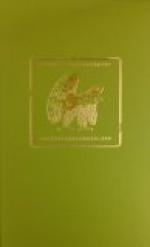“I see.” They were near the fence, and Tisdale swerved a little to reach a stout poplar that formed the corner post. He saw that the wire ends met there and felt in his pocket for his knife. “I see. And then he left the responsibility to his wife.”
“The wedding hadn’t come off,” she said sharply. “It was fixed for the seventeenth of June, and that was only May. And I told him I couldn’t risk it—not in the face of those goats.”
“And he?” pressed Hollis gently. This thistle, isolated, denied human intercourse, was more easily handled than he had hoped.
“He said it suited him all right. He had been wanting to go to Alaska. Nothing but that wedding had kept him back.”
Tisdale stopped and opened his knife. “And he went?” he asked.
“Yes.” The woman’s face worked a little, and she stood looking at him with hard, tragic eyes. “He sold the homestead for what he could get to raise the money to take him to Dawson. He was gone in less than twenty-four hours and before daylight, that night he left, I heard those goats ma-a-ing under my window. He had staked them there in the front yard and tucked a note, with his compliments, in the door. He wrote he didn’t know of anything else he could leave that would make me remember him better.”
Tisdale shook his head. “I wish I had been there.” He slipped the knife in between the ends of the wires and the bole, clawing, prying, twisting. “And you kept them?” he added.
“Yes, I don’t know why, unless it was because I knew it was the last thing he expected. But I hated them worse than snakes. I couldn’t stand it having them around, and I hired a boy to herd them out on his father’s farm. Then I went on helping Dad, selling general merchandise and sorting mail. But the post-office was moved that year five miles to the new railroad station, and they put in a new man. Of course that meant a line of goods, too, and competition. Trade fell off, then sickness came. It lasted two years, and when Dad was gone, there wasn’t much left of the store but debt.” She paused a moment, looking up to the serene sky above the high plateau. A sudden moisture softened her burning eyes, and her free hand crept to her throat. “Dad was a mighty fine man,” she said. “He had a great business head. It wasn’t his fault he didn’t leave me well fixed.”
Tisdale laid the loosened wire down on the ground and started to work on another. “But there was the man in Alaska,” he said. “Of course you let him know.”
“No, sir.” Her eyes flashed back to Tisdale’s face. “You wouldn’t have caught me writing to Johnny Banks, then. I’m not that kind. The most I could do was to see what I could make of the goats. I commenced herding them myself, but I hadn’t the face to do it down there in Oregon, where everybody knew me, and I gradually worked north with them until I ended here.”
Tisdale had dropped his knife. He stooped to pick it up. “That’s where you made your mistake,” he said.




